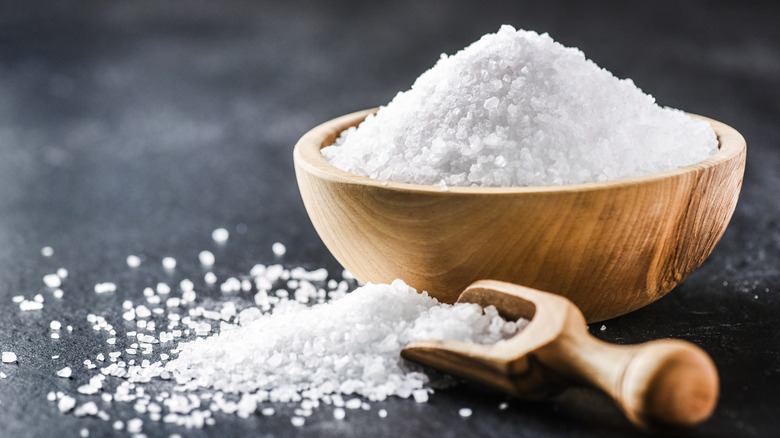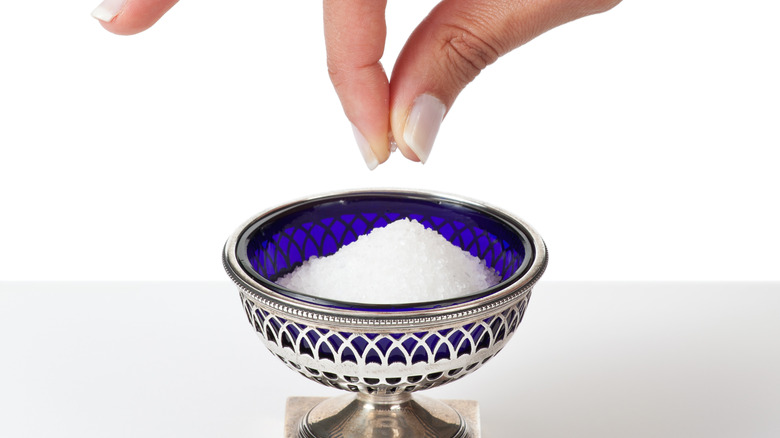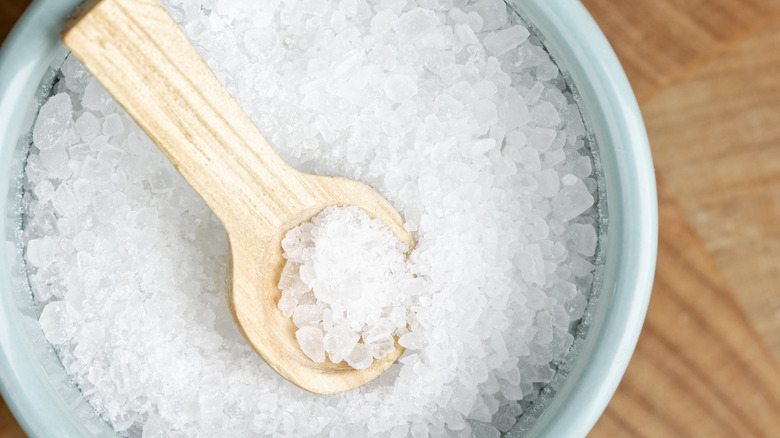The Gross Habit You Should Stray From When Using A Salt Cellar
If you find yourself consistently baking or cooking delicious foods in your kitchen, it may be a good idea to add a salt cellar to your countertop. These bowl-shaped containers can be used with or without a lid, and are a great way to make sure your salt is easily accessible for easy measuring and seasoning. However, if you find yourself tempted to reach in and pinch a little with your fingers to sprinkle in your dish, you may want to think twice.
If you're frequently reaching for the salt to re-season your food while handling other ingredients, you could be risking cross-contamination between different foods. According to a 2022 study published in Food Control, both salmonella and listeria bacteria were transferred to lettuce after the tester handled contaminated chicken, then seasoned lettuce with a pinch of salt from a salt cellar. While cooking the chicken thoroughly can kill that bacteria, other foods that aren't cooked — like the lettuce — will remain contaminated, and could make you sick.
The salt cellar could hold onto that bacteria for a long time
While salmonella and listeria bacteria can make you sick, using your fingers to season with the salt is pretty unsanitary in general. Aside from bacteria picked up from other foods, your hands can carry dirt and grime picked up outside of the kitchen, so keeping your hands clean in the kitchen is just good practice. The issue doesn't end just with contaminating different foods, though — you could also risk transferring that bacteria to the salt cellar itself.
Pathogens can remain alive on glass, plastic, and stainless steel surfaces for a long time, and can be picked up again by touch — meaning they could be lingering alongside your salt while inside the container. While salt does kill bacteria, cross-contamination can potentially make you sick. So if you reach into the contaminated salt cellar with your bare hands, you also run the risk of infecting all future foods seasoned as long as the bacteria are alive. It's better to resist the urge to add a quick pinch of salt in favor of a more sanitary option — like sprinkling some salt in with a spoon instead.
Keeping things clean will prevent illness
Some salt cellars come equipped with a small spoon, if you're looking for a little sprinkle of seasoning, rather than a stricter measurement. But in addition to being more sanitary, using actual measuring tools to add salt to your dishes is a more accurate way of making sure your food comes out delicious, and not overly salty. Thanks to the wider opening, salt cellars make it easy to grab a measuring spoon to scoop out some salt.
While salt might not expire, it's important to periodically empty out and wash your salt cellar, too. Even if you're consistent when it comes to hand washing in the kitchen, swapping out the salt each time you cook will help avoid any contamination. You should wash the entire container with warm water and soap — some salt cellars are even dishwasher-safe. Keeping your salt cellar washed out and hands-free is an easy way to protect yourself and your dinner guests from any harmful bacteria when cooking in the kitchen.


